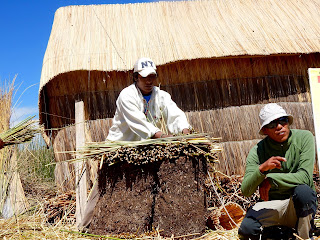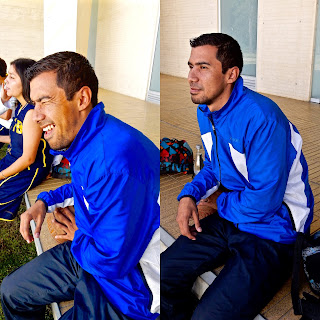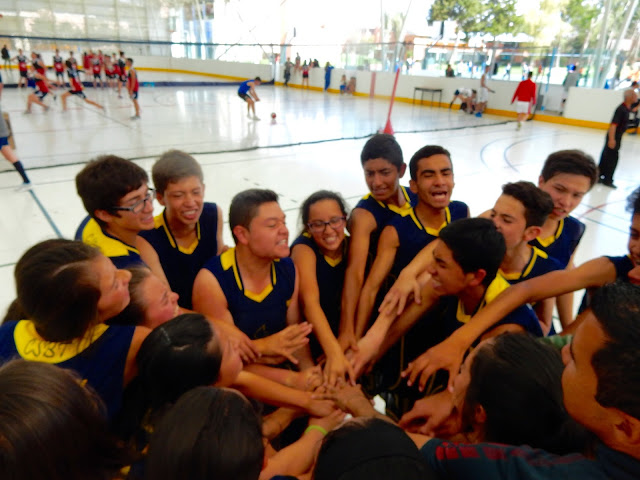 |
| The crew. |
Day 1: Don't get me wrong, we didn't just walk to Machu Picchu. After flying into and staying in Cusco, we woke up at 4:30 and were taken by bus up through the morning fog into the Andean mountains an hour away. At over 14,000 feet, we strapped on what were probably old hockey pads, clipped on BMX helmets, and sped 10,000 feet down the mountain the opposite way we'd ascended on mountain bikes. After two hours of white-knuckled coasting around cliff turns with the wind whipping water from my eyes, we arrived at our lunch spot where our group split up. Devon and myself found ourselves in a trio with a girl from Holland named Fieke (though she just told us to call her Sofi, her nickname). The three of us caught a ride and checked into our hostel for the night before checking out some nearby hot springs, where we met up with our guide and the other two members of our group, Zach and Sirena, a newly wed couple from California whose honeymoon was traveling the world for a year.
Day 2 started with some more adrenaline. We had the option to do some zip-lining in the morning. It cost a little bit extra, but we decided to stick to our trip's theme of why not? or, more colloquially, f@#k it! So after five lines back and forth across a canyon, and a suspension bridge on which the five of us made an uncomfortable experience for those not in our group since we jumped and twisted and shook the bridge the whole time (hey, we were all wearing harnesses), we found our way to the train tracks to follow to Aguas Calientes, the town just below Machu Picchu. There isn't a whole lot of wildlife at high elevation, but the black flies knew where to find fresh tourists. I think in writing this, four weeks after hiking, the fly bites have finally gone from my arms. After an hour or two, we finally arrived at Aguas Calientes, which is the launching point for everyone to hike or bus up to the Machu ruins. We got to our modest hostel tucked behind the ritzy hotels and settled in, an experience vastly improved by the symphonies emanating from the shared bathroom after many had contracted some form of bug or other stomach problem.
 We awoke on Day 3 long before the sun, as we wanted to beat the rush from the gate at the base of the mountain that opened at 5am. After we tourists swarmed in, we quickly spread out as our hiking speeds allowed. Devon and myself found ourselves near dead after just an hour of climbing what was probably a 57 degree angle (never forget your protractor when traveling, kids) to get to the Machu ruins, where we were greeted by hundreds of others who had slept in and hopped on a bus up in order to be fresh for hiking. Where the clouds had shrouded the scenery from us as we climbed, the late morning sun blew them all away and exposed the jungled mountains and ruins. The actual Machu ruins are on a plateau in between quite a few other mountain peaks that the indigenous people called their guardians. So, being the strapping young lads we are, we made the wise choice to climb some more, and made our way up Machu Picchu Mountain. While the views of the surrounding area were phenomenal, I was gassed. This was before hiking all the way back down the entire mountain later.
We awoke on Day 3 long before the sun, as we wanted to beat the rush from the gate at the base of the mountain that opened at 5am. After we tourists swarmed in, we quickly spread out as our hiking speeds allowed. Devon and myself found ourselves near dead after just an hour of climbing what was probably a 57 degree angle (never forget your protractor when traveling, kids) to get to the Machu ruins, where we were greeted by hundreds of others who had slept in and hopped on a bus up in order to be fresh for hiking. Where the clouds had shrouded the scenery from us as we climbed, the late morning sun blew them all away and exposed the jungled mountains and ruins. The actual Machu ruins are on a plateau in between quite a few other mountain peaks that the indigenous people called their guardians. So, being the strapping young lads we are, we made the wise choice to climb some more, and made our way up Machu Picchu Mountain. While the views of the surrounding area were phenomenal, I was gassed. This was before hiking all the way back down the entire mountain later.  |
| Why does everyone on top of a mountain smile for the camera when they're dying inside? |
As soon as our group went from five to five hundred at Aguas Calientes and at Machu Picchu, the question on my mind was What would the ancient Andean people have thought about this? I know, I know, screw me and my hypocritical self-righteousness when I was part of the problem myself. And like many other parts of Peru, I know tourism is huge for the locals. But I should mention that almost none of Machu Picchu's revenue is given to Peru. Apparently, the president of Peru a while back sold rights to British, Canadian, and American businesses to create the monopolies of hotels and transportation that make up the heavy, heavy majority of the sites earnings. So that discomfort kept nagging me, and pinged even more when I would notice what looked like tiny shacks jammed behind hotels and realized that those are where the locals live, or when we stumbled near the edge of the town and found ourselves in a local, not touristy market with women sitting on stools in front of bags of nuts and fruit while their children played on the floor with string, or when I saw a huge storage warehouse that wouldn't have felt out of place except for where it had been empty when we arrived yesterday afternoon, after one day it was overflowing with trash again. My one souvenir from Macchu Picchu is a patch showing the mountain's outline with four Peruvian women seated at its base looking up at it, as if reminiscing that it used to be theirs. It was, literally, the absolute least I could do to remind myself.
 |
| Parts of Machu Picchu you don't see in the ads, trash accumulation. |
Yes, Machu Picchu was great. But I was glad we took our time getting there, because my favorite parts were the little things: all the different people we met at bars and in traveling, joking about how sick we all were on different days, the rush of adrenaline from racing down a mountain on a bike in the rain or down a zip line upside down, playing a never ending card game at a random bar in a tiny town along the way with Broly, Zach, and Sofi, eating guinea pig with Devon, Canadian Henry, and Israeli Dan, and many more events that aren't photoed but were lived pretty damn well.
Finally done with the Peru posts, now I can get back to annoying everyone about my time in Colombia.
JJ
Spanish word of the day: Bailar means to dance, something my hips and knees do not let me excel at. This weekend was full of dancing, as the school had a dance on Friday night for the kids (side note, high school dances in Colombia are way better than in the states) and last night (Sunday) for the parents. So, basically, I danced with the vice-principal and moms until finally getting to dance with someone's cousin who was closer to my age.
Song in my head lately: It hasn't exactly been in my head lately, but Red Grammer's Listen deserves some attention. If you weren't aware, last week marked the anniversary of Jacob Wetterling's abduction from St. Joe 26 years ago, an event which affected many a Joetown native, not just those who also cruised the streets on their bikes as a kid like I did. Red Grammer became popular in our house after Jacob's disappearance since Listen was one of his favorite songs and my parents were friends with the Wetterlings. It deserves a few listens. What with the supposed new evidence coming to light recently, let's hope closure can be found.




























